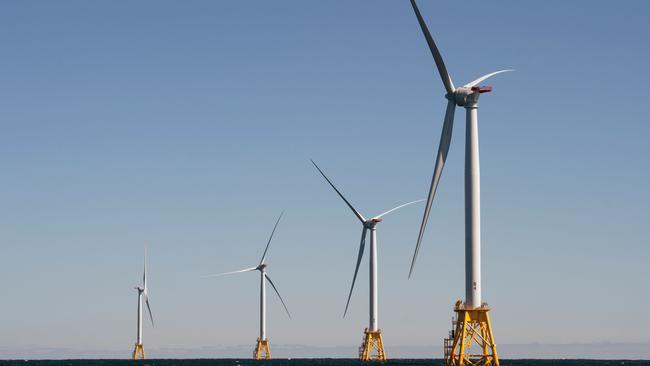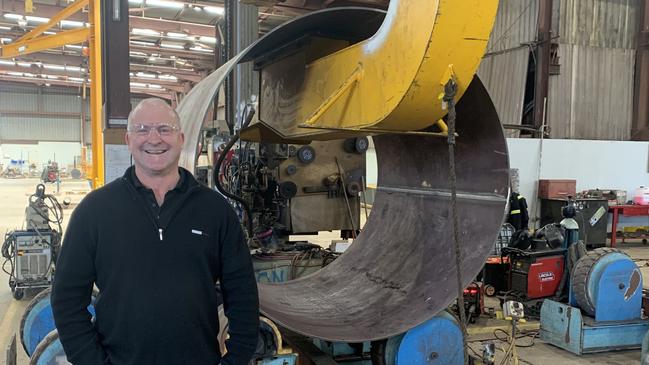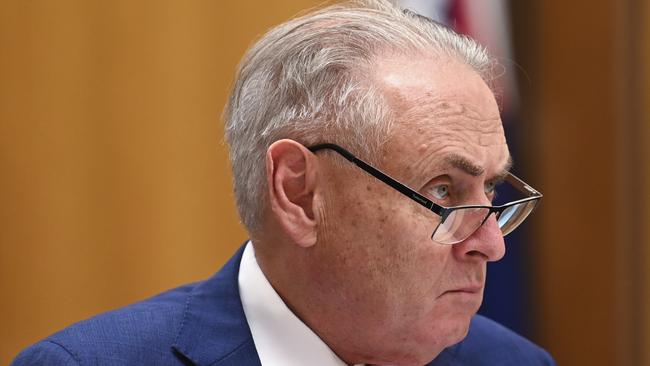Australian wind farm makers fear they have been sold out for China wine deal
Australian wind tower manufacturers say our industry ‘simply won’t exist’ after China’s access to wind tower supply here was improved in exchange for resolving the wine import impasse.

Australian wind tower manufacturers suspect they were traded by Canberra to end Beijing’s tariffs on Australian wine in a deal stitched up a fortnight before Prime Minister Anthony Albanese’s elaborately choreographed trip to China.
The federal government has denied it interfered with Canberra’s independent anti-dumping agency to secure what Beijing has called a “package deal” that traded improved access for Chinese wind towers in Australia for Australian wine in China.
That hasn’t convinced the Victorian wind tower manufacturer Keppel Prince, which last week learned the Anti-Dumping Commission had recommended a tariff on below-cost Chinese rivals should be removed – even though the product was found to have been dumped.
“I would like to think that the Anti-Dumping Commission operates independently,” Dan McKinna, the general manager of Keppel Prince, told The Weekend Australian in his first interview since the recommendation.

“The evidence in what we’re seeing at the moment has to bring that into question.”
The federal government has made the removal of the almost 200 per cent wine tariff a priority in its dealing with China.
Trade Minister Don Farrell, who will accompany the Prime Minister on next week’s trip to China, has spoken about the damage the tariff has done to the industry, including his winemaking neighbours in South Australia’s Clare Valley.
Senator Farrell, a winemaker himself, said he took a bottle of his own red wine for a pre-trip working dinner this Wednesday with China’s Ambassador Xiao Qian “just to make sure that he understands just how good the Australian product is”.
Australian Trade Minister Don Farrell catching up with China's Ambassador Xiao Qian for a pre-trip, working dinner.
— Will Glasgow (@wmdglasgow) October 27, 2023
It's not pictured, but TM Farrell said he brought a bottle of his own red wine along “to make sure that he understands just how good the Australian product isâ€. pic.twitter.com/nYf1e5KpRK
The Anti-Dumping Commission last week recommended the 9 per cent tariff on Chinese wind towers should not be extended. That was despite the commission predicting that Chinese producers would export to Australia at “dumped prices” if the tariff was lifted.
The commission argued that the removal would have no “material injury” because the Australian industry has been unable to compete with Chinese imports, even with the tariff.
Mr McKinna said Keppel had been intending to argue for the tariff to be raised and imposed on all the Chinese firms.
“It’s simply nonsensical … They have found that a product is dumped and yet they are still going to remove the existing measures,” he said.
“If someone can explain the sense in that to me, I’d love to hear it.”
One Chinese manufacturer, Shanghai Taisheng Wind Power Equipment Co, has been exempt from the measures and now has an 86 per cent market share in the Australian market, according to the commission.
Sources in the local industry said the Chinese firm was selling finished wind towers in Australia for prices well below the cost of sourcing the raw materials in Australia to build them.
After the wine deal was announced, the Chinese Commerce ministry suggested Canberra had agreed on Beijing’s compromise.

“China and Australia have held friendly consultations on WTO disputes related to wine and wind towers, and reached a consensus on a proper resolution,” the Beijing-based ministry said in a statement.
The Australian government has insisted the two cases were separate. “This has not been transactional,” Mr Albanese said last Sunday after he announced the wine deal.
Mr McKinna said Keppel Prince would contest the finding and was trying to set up a meeting with Minister for Industry and Science Ed Husic to share its concerns.
He said without anti-dumping measures and local content requirements the industry “simply won’t exist” because of the rampant state support given to its Chinese rivals. The firm has already cut its headcount from 120 to less than 50 as it has failed to win wind tower contracts.
Portland, where Keppel is based on Victoria’s south west coast, was devastated by the sweeping economic coercion campaign China launched after the Morrison government called for an inquiry into Covid-19.
The regional city’s timber, live lobster and nearby wine industries were all struck.
“It was really, really hard on the town,” Mr McKinna said.
For now, only the timber trade to China has resumed.
Mr McKinna said it stung that the commission’s new recommendation had been made under the watch of a Labor government that championed “sovereign capability, local jobs, local manufacturing”.
“To have a situation like this where it’s a dumped product but we’re not going to impose any tariff on it to cover the impact on the competitiveness of the local industry, it’s really disappointing and, quite frankly, really surprising.”




To join the conversation, please log in. Don't have an account? Register
Join the conversation, you are commenting as Logout